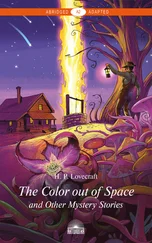“I am sterile,” the first woman informed the men, holding up hands encased in thin, transparent gloves, “so we can proceed immediately.”
Like the men, the women’s skin was yellow, not sallow but a bright, glowing lemon yellow, the hair rich orange. Out of the spacesuits, they would all be dressed more or less alike, barefoot and in shorts in the warm interior of the ship; nor did the women cover their well-formed breasts.
“I reached out,” the second woman told them. “They’re all asleep, but their minds!”
“We know,” the men agreed.
“I rooted around—like a journey through a sewer. But I picked up a good deal. The animal is called a mouse. It is symbolically the smallest and most harmless of creatures, vegetarian, and hunted by practically everything else on this curious planet. Only its size accounts for its survival, and its only skill is in concealment.”
Meanwhile the two men had laid the mouse on the operating table, where it sprawled relaxed and squeaking contentment. While the men went to change out of their spacesuits, the second woman filled a hypodermic instrument, inserted the needle near the base of the mouse’s tail, and gently forced the fluid in. The mouse relaxed and became unconscious. Then the two women changed the mouse’s position, handling the—to them huge—animal with ease and dispatch, as if it had almost no weight; and actually in terms of the gravitation they were built to contend with, it had almost no weight at all.
When the two men returned, they were dressed as were the women, in shorts, and barefoot, with the same transparent gloves. The four of them then began to work together, quickly, expertly—evidently a team who had worked in this manner many times in the past. The mouse now lay upon its stomach, its feet spread. One man put a cone-shaped mask over its head and began the feeding of oxygen. The other man shaved the top of its head with an electric razor, while the two women began an operation which would remove the entire top of the mouse’s skull. Working with great speed and skill, they incised the skin, and then using trephines that were armed with a sort of laser beam rather than a saw, they cut through the top of the skull, removed it, and handed it to one of the men who placed it in a pan that was filled with a glowing solution. The brain of the mouse was thus exposed.
The two women then wheeled over a machine with a turret top on a universal joint, lowered the top close to the exposed brain, and pressed a button. About a hundred tiny wires emerged from the turret top, and very fast, the women began to attach these wires to parts of the mouse’s brain. The man who had been controlling the oxygen flow now brought over another machine, drew tubes out of it, and began a process of feeding fluid into the mouse’s circulatory system, while the second man began to work on the skull section that was in the glowing solution.
The four of them worked steadily and apparently without fatigue. Outside, the night ended and the sun rose, and still the four space people worked on. At about noon they finished the first part of their work and stood back from the table to observe and admire what they had done. The tiny brain of the mouse had been increased fivefold in size, and in shape and folds resembled a miniature human brain. Each of the four shared a feeling of great accomplishment, and they mingled their thoughts and praised each other and then proceeded to complete the operation. The shape of the skull section that had been removed was now compatible with the changed brain, and when they replaced it on the mouse’s head, the only noticeable difference in the creature’s appearance was a strange, high lump above his eyes. They sealed the breaks and joined the flesh with some sort of plastic, removed the tubes, inserted new tubes, and changed the deep unconsciousness of the mouse to a deep sleep.
For the next five days the mouse slept—but from motionless sleep, its condition changed gradually, until on the fifth day it began to stir and move restlessly, and then on the sixth day it awakened. During these five days it was fed intravenously, massaged constantly, and probed constantly and telepathically. The four space people took turns at entering its mind and feeding it information, and neuron by neuron, section by section, they programmed its newly enlarged brain. They were very skilled at this. They gave the mouse background knowledge, understanding, language, and self-comprehension. They fed it a vast amount of information, balanced the information with a philosophical comprehension of the universe and its meaning, left it as it had been emotionally, without aggression or hostility, but also without fear. When the mouse finally awakened, it knew what it was and how it had become what it was. It still remained a mouse, but in the enchanting wonder and majesty of its mind, it was like no other mouse that had ever lived on the planet Earth.
The four space people stood around the mouse as it awakened and watched it. They were pleased, and since much in their nature, especially in their emotional responses was childlike and direct, they could not help showing their pleasure and smiling at the mouse. Their thoughts were in the nature of a welcome, and all that the mind of the mouse could express was gratitude. The mouse came to its feet, stood on the floor where it had lain, faced each of them in turn, and then wept inwardly at the fact of its existence. Then the mouse was hungry and they gave it food. After that the mouse asked the basic, inevitable question:
“Why?”
“Because we need your help.”
“How can I help you when your own wisdom and power are apparently without measure?”
The first spaceman explained. They were explorers, cartographers, surveyors—and behind them, light-years away, was their home planet, a gigantic ball the size of our planet Jupiter. Thus their small size, their incredible density. Weighing on earth only a fraction of what they weighed at home, they nevertheless weighed more than any earth creature their size—so much more that they walked on earth in dire peril of sinking out of sight. It was quite true that they could go anywhere in their spacecraft, but to get all the information they required, they would have to leave it—they would have to venture forth on foot. Thus the mouse would be their eyes and their feet.
“And for this a mouse!” the mouse exclaimed. “Why? I am the smallest, the most defenseless of creatures.”
“Not any longer,” they assured him. “We ourselves carry no weapons, because we have our minds, and in that way your mind is like ours. You can enter the mind of any creature, a cat, a dog—even a man—stop the neuron paths to his hate and aggression centers, and you can do it with the speed of thought. You have the strongest of all weapons—the ability to make any living thing love you, and having that, you need nothing else.”
Thus the mouse became a part of the little group of space people who measured, charted, and examined the planet Earth. The mouse raced through the streets of a hundred cities, slipped in and out of hundreds of buildings, crouched in corners where he was privy to the discussions of people of power who ruled this part or that part of the planet Earth, and the space people listened with his ears, smelled with his sensitive nostrils, and saw with his soft brown eyes. The mouse journeyed thousands of miles, across the seas and continents whose existence he had never dreamed about. He listened to professors lecturing to auditoriums of college students, and he listened to the great symphony orchestras, the fine violinists and pianists. He watched mothers give birth to children and he listened to wars being planned and murders plotted. He saw weeping mourners watch the dead interred in the earth, and he trembled to the crashing sounds of huge assembly lines in monstrous factories. He hugged the earth as bullets whistled overhead, and he saw men slaughter each other for reasons so obscure that in their own minds there was only hate and fear.
Читать дальше












